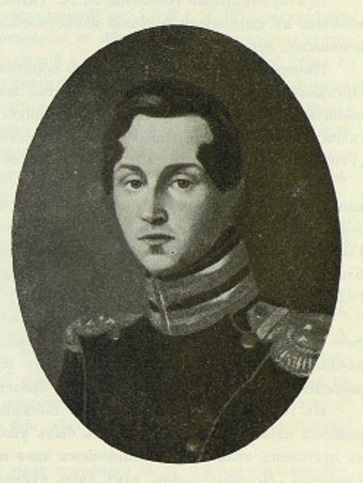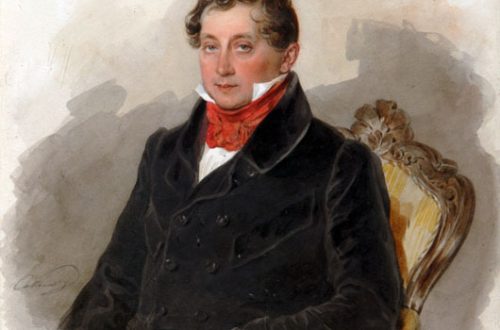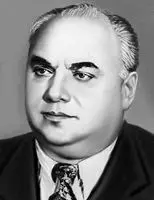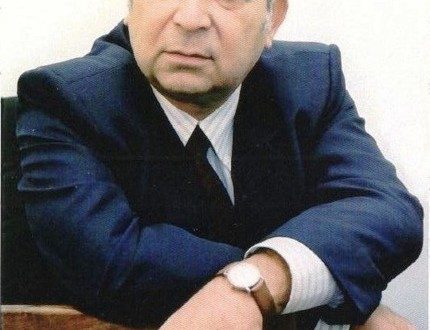
Alexei Nikolayevich Titov |
Alexey Titov
Nikolay Sergeevich TITOVY (? — 1776) Alexei Nikolaevich (23 July 1769, St. Petersburg – 20 XI 1827, ibid.) Sergei Nikolaevich (1770 – 5 V 1825) Nikolai Alekseevich (10 V 1800, Petersburg – 22 XII 1875, ibid.) Mikhail Alekseevich (17 IX 1804, St. Petersburg – 15 XII 1853, Pavlovsk) Nikolai Sergeevich (1798 — 1843, Moscow)
The family of Russian musicians Titovs left a noticeable mark in the history of Russian culture of the era of “enlightened dilettantism”. Their musical activity developed over a long period, covering the second half of the 6th and the first half of the 1766th century. 1769 members of this noble family were prominent amateur musicians, as they said then, “amateurs”. Representatives of the noble intelligentsia, they devoted their free time to the fine arts, without having a special, systematic musical education. As was customary in the aristocratic circle, they were all in military service and had high ranks, from guards officer to major general. The ancestor of this musical dynasty, colonel, state councilor N. S. Titov, was a famous poet, playwright and composer of Catherine’s times. One of the most educated people of his time, he was a passionate lover of the theater and in 1767 opened a theater company in Moscow, the entrepreneur of which was until 1795, when his offspring passed into the hands of foreign entrepreneurs Belmonti and Chinti, N. S. Titov composed several one-act comedies, including “The Deceived Guardian” (posted in 1768 in Moscow) and “What will be, it will not be avoided, or Vain Precaution” (posted in XNUMX in St. Petersburg). It is known that, in addition to the text, he also wrote music for the national Russian performance, called “The New Year, or the Meeting of Vasilyev’s Evening” (posted in XNUMX in Moscow). This suggests that he composed music for other performances as well.
The sons of N. S. Titov – Alexei and Sergei – were prominent musicians of the late XNUMXth – early XNUMXth centuries, and their children – Nikolai Alekseevich, Mikhail Alekseevich and Nikolai Sergeevich – popular amateur composers of Pushkin’s time. The musical activity of the older Titovs was connected with the theater. The creative biography of A. N. Titov was quite rich, although relatively short. A man close to the imperial court, a major general, a passionate lover of art, a composer and a violinist, he was the owner of a music salon, which became one of the largest centers of the artistic life of St. Petersburg. The home concerts, which were often performed by chamber ensembles, were attended by the Titov brothers themselves – Alexey Nikolayevich played the violin excellently, and Sergey Nikolayevich played the viola and cello – and numerous domestic and foreign artists. The owner of the salon himself, according to his son Nikolai Alekseevich, “was of rare kindness, a master of living and treating; educated, intelligent, he was always cheerful and extremely amiable in society, had the gift of eloquence and even wrote sermons.
A. N. Titov went down in history as a prolific theater composer, the author of more than 20 musical stage works of various genres. Among them are 10 operas of various content: comic, heroic, lyric-sentimental, historical and everyday, and even a patriotic opera “From Russian History” (“The Courage of a Kievite, or These Are the Russians,” staged in 1817 in St. Petersburg). Especially popular were everyday comic operas based on texts by A. Ya. Knyaznin “Yam, or the Post Station” (1805), “Gatherings, or Consequence of the Pit” (1808) and “Girlfriend, or Filatkin’s Wedding” (1809), which constitute a kind of trilogy ( all of them were delivered in St. Petersburg). A. N. Titov also composed music for ballets, melodramas, and dramatic performances. His musical language is mainly sustained in the traditions of European classicism, although in everyday comic operas there is a tangible connection with the melody of the Russian everyday song-romance.
S. N. Titov was a year younger than his brother, and his creative path turned out to be even shorter – he died at the age of 55. Having finished his military career with the rank of lieutenant general, in 1811 he retired and entered the civil service. A regular participant in musical meetings in his brother’s house – and he was a talented cellist, well-versed in the piano and viola – Sergei Nikolayevich, like his brother, composed theatrical music. Among his works, performances stand out, showing the living Russian modernity, which was an unusual and progressive phenomenon for that time. These are the ballet “New Werther” (staged by I. Valberkh in 1799 in St. Petersburg), the heroes of which were residents of Moscow of that era, who performed on stage in appropriate modern costumes, and “folk vaudeville” based on the play by A. Shakhovsky “Peasants, or Meeting of the Uninvited” (posted in 1814 in St. Petersburg), which tells about the struggle of partisans against the Napoleonic invasion. The music of the ballet corresponds to its sentimental plot, which tells about the feelings of ordinary people. The vaudeville opera The Peasants, or the Meeting of the Uninvited, like the divertissement genre common at that time, is built on the use of folk songs and romances. The sons of A. N. Titov – Nikolai and Mikhail, – as well as the son of S. N. Titov – Nikolai – went down in the history of Russian musical culture as the “pioneers” of the Russian romance (B. Asafiev). Their work was completely connected with everyday music-making in the salons of the noble intelligentsia and the aristocracy of the 1820-40s.
The greatest fame fell to the share of N. A. Titov, one of the most popular composers of the Pushkin era. He lived all his life in Petersburg. For eight years he was assigned to the cadet corps, then he was brought up in several private boarding schools. He started learning to play the piano at the age of 11-12, under the guidance of German teachers. From the age of 17, for almost half a century, he was in military service, retiring with the rank of lieutenant general in 1867. He began to compose at the age of 19: it was at this time that, by his own admission, “for the first time his heart spoke and poured out of depths of the soul “his first romance. Lacking the necessary theoretical training, the novice composer was forced to “gradually reach everything himself”, focusing on the French romances of F. Boildieu, Ch. Lafon and others known to him. , then for some time he took lessons from the Italian singing teacher Zamboni and from the contrapuntalist Soliva. However, these studies were short-lived, and in general, K. A. Titov remained a self-taught composer, a typical representative of Russian “enlightened dilettantism”.
In 1820, the romance “Solitary Pine” was published, which was the first published work of N. A. Titov and brought him wide fame. The popularity of this romance is confirmed by its mention in the story “Tatyana Borisovna and her nephew” from I. Turgenev’s “Notes of a Hunter”: firmly entrenched in the bar-estate and salon-aristocratic life, Titov’s romance lives, as it were, an independent life in this environment, which has already forgotten its name its author, and even erroneously attributed to A. Varlamov.
In the 20s. various salon dance pieces by Titov began to be published – quadrilles, polkas, marches, waltzes for piano. Among them there are pieces of a chamber, intimate nature, which gradually lose their applied significance and turn into an artistic miniature and even into a program work. Such, for example, are the “French” quadrille “Sins of youth” (1824) and “A novel in 12 waltzes” called “When I was young” (1829), which depicts a sentimental story of rejected love. The best piano pieces by N. A. Titov are characterized by simplicity, sincerity, sincerity, melody, close in style to Russian everyday romance.
In the 30s. the composer met M. Glinka and A. Dargomyzhsky, who took a warm interest in his work and, according to Titov himself, called him “the grandfather of the Russian romance.” Friendly relations connected him with the composers I. Laskovsky and A. Varlamov, who dedicated his romance “Youth has flown by a nightingale to Titov”. In the 60s. Nikolai Alekseevich often visited Dargomyzhsky, who not only gave him creative advice, but also transcribed his romances “Forgive me for a long separation” and “Flower” into two voices. N. A. Titov lived for 75 years, capturing the second half of the 1820th century. – the heyday of Russian musical classics. However, his work is entirely connected with the artistic atmosphere of the salons of the noble intelligentsia of the 40-XNUMXs. Composing romances, he most often turned to poems by amateur poets, dilettantes like himself. At the same time, the composer did not pass by the poetry of his great contemporaries – A. Pushkin (“To Morpheus”, “Bird”) and M. Lermontov (“Mountain Peaks”). The romances of N. A. Titov are mostly sentimental and sensitive, but among them there are also romantic images and moods. The interpretation of the theme of loneliness is noteworthy, the range of which extends from the traditional painful separation from a beloved to romantic homesickness (“Vetka”, “Russian Snow in Paris”) and the loneliness of a romantically inclined person among people (“Pine”, “Do not be surprised, friends”) . Titov’s vocal compositions are distinguished by melodic melodiousness, sincere warmth, and a subtle sense of poetic intonation. In them, in their original, still naive and in many respects imperfect form, sprouts of the most important qualities of Russian vocal lyrics, characteristic melodic turns, sometimes anticipating the intonations of Glinka’s romances, typical types of accompaniment, the desire to reflect the mood of the romance in the piano part, are formed.
Peru N. A. Titov owns more than 60 romances in Russian and French texts, more than 30 dance pieces for piano, as well as dances for orchestra (2 waltzes, quadrille). It is known that he also composed poems: some of them formed the basis of his romances (“Ah, tell me, good people”, “Frenzy”, “Silence your heart”, etc.), others were preserved in a handwritten notebook, jokingly called by him “My inspiration and stupidity. The dedication to “My Sons”, which opens this notebook, draws the creative credo of the amateur composer, who found joy and relaxation in his work:
Who hasn’t done stupid things in this world? Another wrote poetry, another rattled the lyre. God sent poetry and music to me in inheritance, Loving them with my soul, I wrote as best I could. And so I ask for forgiveness When presented to you – moments of inspiration.
The younger brother of N. A. Titov, Mikhail Alekseevich, following the family tradition, served as an officer in the Preobrazhensky Regiment. Since 1830, having retired, he lived in Pavlovsk, where he died at the age of 49. There is evidence that he studied composition with the theorist Giuliani. Mikhail Alekseevich is known as the author of sentimental romances to Russian and French texts, with an elegant piano part and a somewhat trite and sensitive melody, often approaching the style of a cruel romance (“Oh, if you loved like that”, “Why did the lovely dream disappear”, “ Expectation “- on the article of unknown authors). Noble sophistication distinguishes the best of his salon dance pieces for piano, imbued with the melancholy moods of early romanticism. The plasticity of the melodics, close to the Russian everyday romance, the refinement, gracefulness of the texture give them a peculiar charm of the refined art of aristocratic salons.
The cousin of N. A. and M. A. Titov, N. S. Titov, lived only 45 years – he died of throat consumption. According to the customs of this family, he was in military service – he was a guards dragoon of the Semenovsky regiment. Like his cousins, he was an amateur composer and composed romances. Along with many similarities, his romance work also has its own individual characteristics. Unlike N. A. Titov, with his sincere cordiality and simplicity, Nikolai Sergeevich has a more parlor, noble-contemplative tone of expression. At the same time, he strongly gravitated towards romantic themes and images. He was less attracted to amateur poetry, and he preferred the poems of V. Zhukovsky. E. Baratynsky, and most of all – A. Pushkin. In an effort to more accurately reflect the content and rhythmic features of the poetic text, he constantly experimented in the field of rhythm intonation, form, in the use of more modern, romantic means of musical expression. His romances are characterized by a desire for continuous development, a comparison of modes of the same name, and tertian correlations of tonalities. Interesting, despite the imperfection of the incarnation, is the idea of the romance “in three parts” at st. Baratynsky “Separation – Waiting – Return”, which is an attempt to create a three-part composition of through development based on changes in the psychological states of the lyrical hero. Among the best works of N. S. Titov are Pushkin’s romances “The Tempest”, “The Singer”, “Serenade”, “The Fountain of the Bakhchisarai Palace”, in which there is a departure from traditional sensitivity towards the creation of an expressive lyric-contemplative image.
The works of the brothers HA, M. A. and N. S. Titovs are typical and at the same time the most striking examples of amateur creativity of Russian amateur composers of the Pushkin era. In their romances, characteristic genres and methods of musical expressiveness of Russian vocal lyrics developed, and in dance miniatures, with their subtle poetry and desire for individualization of images, a path was outlined from everyday plays of applied significance to the emergence and development of programmatic genres of Russian piano music.
T. Korzhenyants





